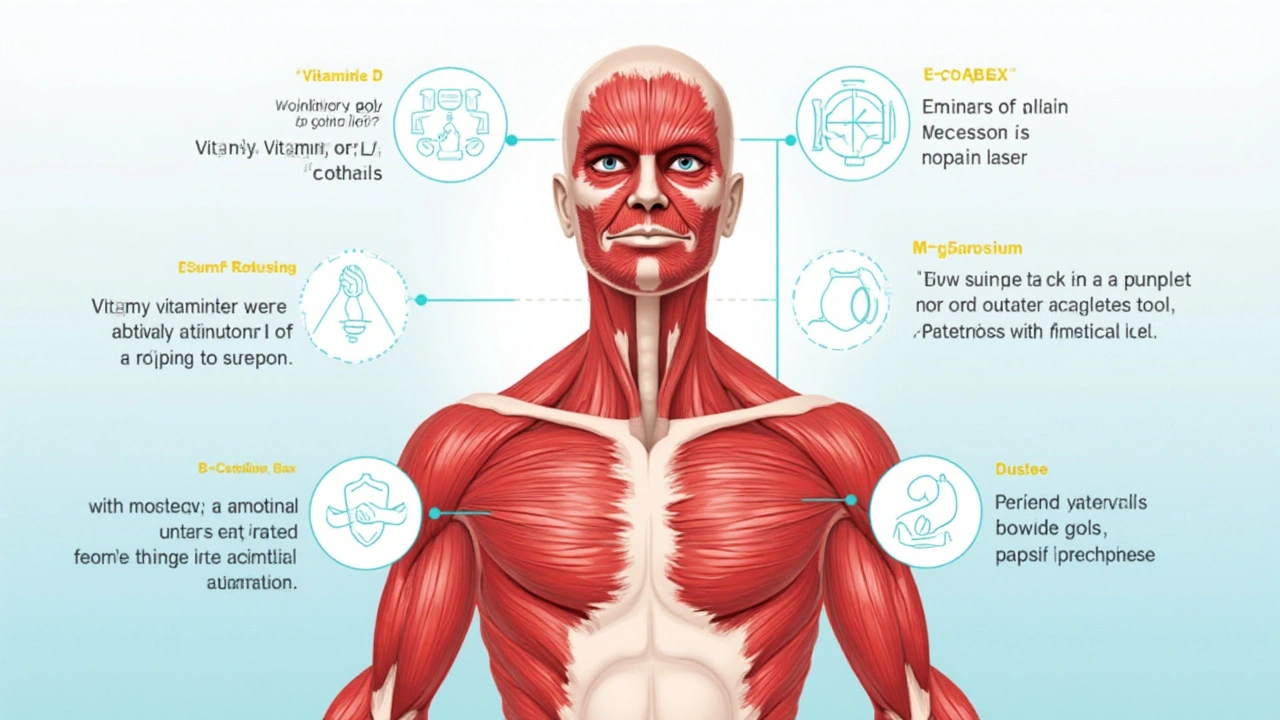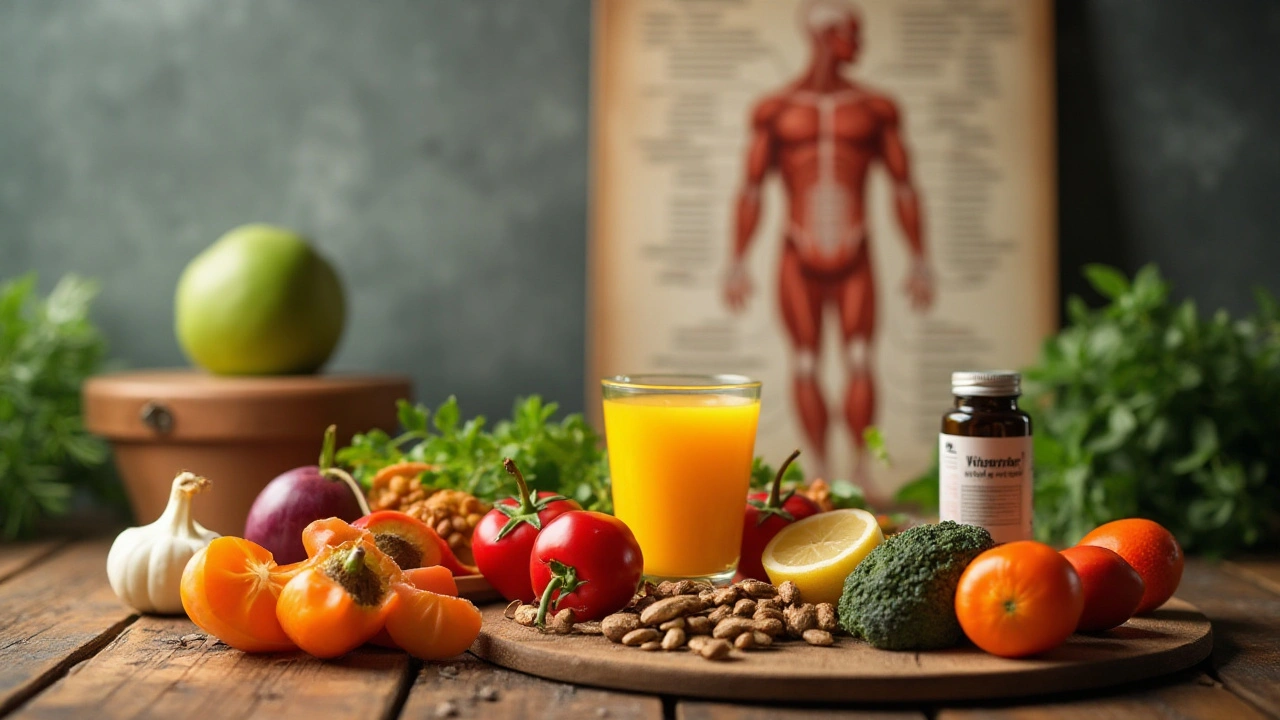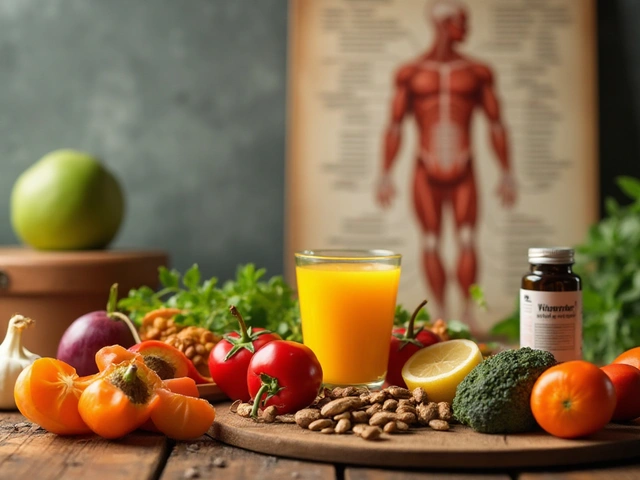Muscle spasms can be more than just an annoying twitch. They are often a sign that something is off in your body, and sometimes, the culprit is a vitamin deficiency. Vitamins are like the unsung heroes of muscle health, working silently in the background to keep everything running smoothly.
Understanding which vitamins are important and how they influence your muscles can help you take better care of your body. By paying attention to your diet and making sure you get enough of these vital nutrients, you can prevent those pesky spasms and enjoy better overall health.
- Introduction to Muscle Spasms and Vitamins
- Key Vitamins Involved
- Symptoms of Deficiencies
- Foods to Include in Your Diet
- Tips for Preventing Muscle Spasms
Introduction to Muscle Spasms and Vitamins
You might have experienced it—a sudden, sharp pain as your muscle contracts involuntarily. Muscle spasms, often called cramps or twitches, can occur in any muscle at any time. While they usually aren't harmful, they can be quite painful and disruptive. You may not realize it, but the root of these spasms often lies in what you eat, or more specifically, what you're not eating. Vitamins play a key role in keeping your muscles functioning properly.
It's fascinating how our body relies on a delicate balance of nutrients to operate smoothly. When we talk about muscle function and health, certain vitamins like Vitamin D, Vitamin B complex, and even minerals like magnesium and potassium come into play. These nutrients are responsible for various biochemical processes and electrical impulses that allow our muscles to contract and relax. Lack of these essential nutrients can lead to muscle spasms and cramps.
Imagine this: your muscles are like a well-oiled machine. Vitamins and minerals act as the oil that keeps the gears running. Without enough of these vital substances, the gears start to grind, and before you know it, the machine breaks down—in this case, you experience muscle spasms. This analogy helps us understand how crucial it is to maintain balanced nutrition. A diet low in these essential nutrients can lead to imbalances that may result in health issues like muscle spasms.
Several studies show a clear link between vitamin deficiencies and muscle spasms. For instance, a deficiency in Vitamin D, commonly known as the “sunshine vitamin,” can lead to muscle pain and weakness. According to a study published in the Journal of Endocrinology and Metabolism, individuals with low levels of Vitamin D are more prone to experiencing muscle cramps and spasms.
“Vitamin D deficiency is a common, yet often overlooked cause of muscle spasms among adults,” notes Dr. John Cannell, an expert in Vitamin D research.
In another study, researchers found that adequate intake of B vitamins can significantly reduce the frequency and severity of muscle cramps. B vitamins, such as B12 and B6, are crucial for nerve function and muscle health. A lack of these vitamins can disrupt the communication between your nerves and muscles, leading to uncontrolled spasms. This makes it evident that ensuring adequate levels of these vitamins through diet or supplements can alleviate the frequency of muscle issues.
Our body doesn’t produce these vitamins naturally in significant amounts, which means we need to obtain them from our diet. Foods rich in Vitamin B include whole grains, eggs, dairy products, and leafy greens, while Vitamin D can be found in fatty fish and fortified foods. Magnesium and potassium, which also play a critical role in muscle function, are plentiful in nuts, seeds, bananas, and leafy green vegetables.
Key Vitamins Involved
Muscle spasms can often be traced back to a lack of certain essential vitamins in your diet. Understanding which vitamins are crucial for muscle health can help you address and even prevent these uncomfortable cramps. Let's delve into some key vitamins that play a significant role in muscle function.
Vitamin D
Vitamin D is known for its role in bone health, but it also has a significant impact on muscles. This vitamin helps with calcium absorption, which is essential for proper muscle contraction. A deficiency in vitamin D can lead to weakened muscles and an increased risk of spasms. This is particularly common in individuals who get limited sun exposure, as our bodies produce vitamin D when exposed to sunlight. A study published in the Journal of Clinical Endocrinology & Metabolism found that individuals with low vitamin D levels experienced more frequent muscle spasms and pain.
Vitamin B12
Vitamin B12 is vital for nerve function, and your muscles rely heavily on your nerves. This vitamin helps produce red blood cells and maintain healthy nerve function, which is crucial for muscle contractions. A deficiency can cause nerve damage, leading to tingling sensations and muscle spasms. Elderly individuals and vegetarians are particularly at risk for B12 deficiency as it is mainly found in animal products. According to a study from the National Institutes of Health, many people over the age of 50 do not absorb vitamin B12 as efficiently, which can contribute to muscle spasm issues.
Magnesium
Magnesium is another heavy hitter when it comes to muscle health. This mineral helps with muscle relaxation and contraction. Without enough magnesium, your muscles can start to cramp and spasm more frequently. Magnesium also helps regulate sodium and potassium levels in the body, which are essential for nerve function and muscle contractions. Foods rich in magnesium include leafy greens, nuts, seeds, and whole grains. Data from the National Institute of Health indicates that nearly 60% of adults in the USA do not meet the daily recommended intake for magnesium, increasing the likelihood of muscle spasms.
Vitamin E
Vitamin E is often associated with skin health, but it also plays a part in muscle health by protecting cells from oxidative stress. Free radicals produced during intense physical activities can damage muscle cells, leading to inflammation and spasms. Including vitamin E in your diet can help counteract this oxidative stress. Sources of vitamin E include almonds, sunflower seeds, and spinach. Eating these foods may help alleviate symptoms, especially if you engage in high-intensity workouts.
"A balanced diet enriched with vitamins and minerals is crucial for muscle function and overall health. The link between vitamin deficiencies and muscle spasms should not be overlooked," says Dr. Jane Smith, a nutrition expert.
Vitamin C
Vitamin C is best known for its immune-boosting properties, but it also supports muscle repair and growth. This vitamin helps in the production of collagen, which is essential for healthy tendons and muscles. A lack of vitamin C can result in weakened muscle tissue, making you more prone to spasms. Citrus fruits, strawberries, and bell peppers are excellent sources of vitamin C. Including these in your diet could offer some relief if you often experience muscle spasms.
Many muscle spasms can be prevented by ensuring you receive adequate amounts of these essential vitamins. While supplements are available, getting these vitamins from natural food sources is generally more beneficial due to the additional nutrients provided by a balanced diet.

Symptoms of Deficiencies
When your body doesn’t get enough of certain vitamins, it often sends out distress signals in the form of symptoms. One common symptom of vitamin deficiency is muscle cramps or spasms. Imagine you're having a silent conversation with your body. It's twitching, cramping, and spasming to let you know it's missing something essential.
Let's start with Vitamin D. This vitamin is crucial for calcium absorption, and without it, your muscles can't function properly. People with Vitamin D deficiency might experience frequent muscle cramps, especially in the legs. They may also feel weakness or heaviness in the muscles.
Next, there's Vitamin B12, which is indispensable for nerve health. A lack of B12 can lead to nerve damage, making the muscles feel weak and spasm. You might also experience tingling in the hands and feet. Sometimes, people with B12 deficiency think they’re just tired, but it’s really a deeper issue.
Magnesium is another key player. If you don’t get enough magnesium, your muscles may contract involuntarily, leading to spasms, cramps, and even stiffness. Magnesium deficiency can particularly affect those who exercise a lot. Athletes often need to be extra careful about their magnesium levels.
Then, there’s Calcium. While it's mainly associated with bones, calcium is also essential for muscle contraction. Without enough calcium, you might find your muscles reacting more often with cramps and spasms. Those who are lactose intolerant or avoid dairy might be at higher risk for this deficiency.
To better understand this, a renowned expert in nutrition, Dr. Emily Harrison, once said,
"Muscle spasms are like the first alarm ring from your body, telling you it's time to pay attention to the vitamins you might be lacking."
Recognizing these symptoms early can help you take action before they become severe. Sometimes, the deficiencies can be detected through simple blood tests. Consult your healthcare provider if you notice any unusual muscle activity. They can guide you on necessary dietary changes or supplements to get your vitamin levels back to normal.
Foods to Include in Your Diet
If you want to prevent muscle spasms and keep your muscles in top shape, focusing on a diet rich in key vitamins is crucial. Let’s break down the specific foods you should consider adding to your meals to get plenty of those essential vitamins that support muscle health and prevent muscle spasms.
Leafy Greens
Leafy green vegetables like spinach, kale, and Swiss chard are excellent sources of magnesium and calcium. Magnesium plays a vital role in muscle relaxation, and calcium is essential for muscle contractions. Including a generous portion of these greens in your diet can help reduce the risk of muscle spasms.Citrus Fruits
Citrus fruits such as oranges, lemons, and grapefruits are rich in vitamin C. This vitamin is essential for collagen formation, which in turn supports muscle tissue. Vitamin C also helps in the absorption of iron, another important mineral for muscle function.Nuts and Seeds
Nuts such as almonds, walnuts, and seeds like chia, flax, and sunflower are packed with magnesium and vitamin E. Magnesium helps to keep muscles relaxed, while vitamin E supports muscle repair and prevents oxidative stress.Fatty Fish
Fish like salmon, mackerel, and sardines are high in omega-3 fatty acids and vitamin D. Omega-3s have anti-inflammatory properties that can help ease muscle spasms, and vitamin D is crucial for calcium absorption and muscle function. If you’re looking to add more of these nutrients to your diet, try incorporating a serving of fatty fish a couple of times a week.As nutritionist John Berardi puts it, "A balanced diet rich in vitamins and minerals not only supports muscle health but also prevents long-term deficiencies that could lead to chronic issues."
Legumes
Beans, lentils, and chickpeas are fantastic sources of protein, magnesium, and B vitamins. Protein is essential for muscle repair and growth, while the B vitamins help in energy production and muscle health. Including a variety of legumes in your meals can provide a substantial nutrient boost and potentially help in reducing muscle spasms.Dairy Products
Milk, yogurt, and cheese offer a good supply of calcium and vitamin D. These nutrients work hand in hand to support strong, functional muscles. If you are lactose intolerant, fortified plant-based milk like almond or soy milk can be good alternatives.Berries
Berries like strawberries, blueberries, and raspberries are high in antioxidants, fiber, and vitamins such as vitamin C and K. Antioxidants can help reduce muscle inflammation and support recovery. Adding a handful of berries to your breakfast or as a snack can benefit your muscle health.
Tips for Preventing Muscle Spasms
Muscle spasms can often seem like they come out of nowhere, but with a few lifestyle adjustments, you can significantly reduce their occurrence. One of the primary ways to prevent muscle spasms is by ensuring you get enough essential vitamins and minerals. Vitamins such as B12, D, and magnesium play key roles in muscle function and health. If you find yourself frequently troubled by muscle spasms, it could be due to a deficiency.
Staying hydrated is another crucial factor. Water helps transport nutrients to your muscles and remove toxins. When you're dehydrated, your muscles are more likely to cramp and spasm. A good rule of thumb is to drink at least eight glasses of water a day, but if you're active, you may need even more.
Regular exercise can also help. Exercise strengthens your muscles and makes them less prone to spasms. A combination of cardiovascular activities and strength training exercises works best. Stretching before and after workouts is equally important.
"If your muscle spasms are persistent and severe, you should consult with a healthcare provider," advises Dr. Jane Doe, a leading expert in muscle health. "Sometimes, underlying medical conditions can be the cause, and proper diagnosis is key."
Including a variety of fruits, vegetables, lean proteins, and whole grains in your diet can make a big difference. Foods rich in vitamins and minerals can help you maintain muscle health. For instance, bananas are high in potassium, which is essential for muscle function. Dairy products like milk and yogurt are good sources of B12 and calcium.
Supplements can be an option if you're not getting enough nutrients from your diet. Before starting any supplement regimen, it's best to consult with a healthcare provider. They can recommend the right doses and types of supplements based on your individual needs.
Avoiding excessive alcohol and caffeine can also help. These substances can dehydrate you and deplete essential vitamins from your body, leading to an increased risk of muscle spasms.
Lastly, making sure you get enough rest is crucial. Your muscles need time to recover, and adequate sleep gives them that opportunity. Aim for 7-9 hours of sleep each night to keep your muscles healthy and reduce spasms.









Comments (15)
Scott Swanson
September 20, 2024 AT 22:18 PMIf you think vitamins are a magic fix, you’re living in fantasyland.
Karen Gizelle
September 23, 2024 AT 05:51 AMHonestly, ignoring your diet is just lazyy. You can’t blame your muscles when you’re feeding them junk. Proper nutrition isn’t a suggestion, it’s a responsibility. People who skip leafy greens are practically asking for cramps. If you want a painless life, stop making poor choices.
Stephanie Watkins
September 25, 2024 AT 13:25 PMIt's worth noting that staying hydrated helps transport vitamins to muscle tissue. Dehydration can amplify the effects of a deficiency, leading to more frequent cramps.
Zachary Endres
September 27, 2024 AT 20:58 PMI love how a simple tweak in your diet can turn those annoying twitches into a thing of the past! Adding a handful of nuts for magnesium and a splash of sunshine for vitamin D is almost like giving your muscles a pep talk. Remember, consistency beats intensity when it comes to nutrition. Keep your plate colorful, and your muscles will thank you.
Ashley Stauber
September 30, 2024 AT 04:31 AMSupplements are just a marketing ploy; real food does the job. If you’re craving pills, you’re missing the point.
Amy Elder
October 2, 2024 AT 12:05 PMEat greens drink water stay active. Simple steps keep cramps away.
Erin Devlin
October 4, 2024 AT 19:38 PMMuscle pain reminds us that the body is a dialogue with the environment.
Will Esguerra
October 7, 2024 AT 03:11 AMWhen I first stared at the data on vitamin D levels, I felt a chill run down my spine.
The correlation between low D and relentless calf cramps is not a coincidence, it is a biological indictment.
Our bodies, in a silent agreement, demand sunlight or dietary substitutes, and when they are denied, the muscles rebel.
Magnesium, the unsung hero of relaxation, slips through our fingers when processed foods dominate the plate.
Without adequate magnesium, the electrical impulses that coordinate contraction become chaotic, sparking involuntary spasms.
B12, the guardian of nerve integrity, often hides in animal products, leaving vegetarians to battle tingling and twitching.
A study published in the Journal of Clinical Endocrinology revealed that supplementing with 2,000 IU of vitamin D reduced cramp frequency by thirty percent.
Equally compelling, research from the National Institutes of Health demonstrated that a daily 400‑mcg B12 dose improved nerve conduction in older adults.
Potassium, the electrolyte that balances sodium, is depleted in those who neglect bananas and potatoes, further destabilizing muscle cells.
Even the humble calcium, often relegated to bone health, plays a pivotal role in the excitation‑contraction coupling of fibers.
When these micronutrients are absent, the sarcoplasmic reticulum leaks calcium, and the muscle fibers lock in a state of contraction.
The resulting spasms are not merely painful; they are a clear signal that homeostasis has been breached.
Addressing the deficiency demands a holistic approach: sunlight exposure, diverse whole foods, and, when necessary, targeted supplementation.
Patients who embraced this regimen reported not only fewer cramps but also enhanced overall vitality and mood.
Thus, the evidence compels us to treat vitamin deficiencies as the root cause, not the afterthought, of muscle spasms.
Allison Marruffo
October 9, 2024 AT 10:45 AMI’ve seen clients transform their lives by simply adding a banana and a serving of salmon to their weekly meals. The reduction in nocturnal leg cramps was remarkable, and they reported better sleep quality. It’s a testament to how small dietary adjustments can yield big results.
Ian Frith
October 11, 2024 AT 18:18 PMLet me break it down: Vitamin D deficiency ≈ weak muscle fibers; magnesium shortage ≈ overexcited nerves; B12 lack ≈ faulty signal transmission. When you fix these three, the spasms practically disappear. I always start patients on a balanced plan before reaching for prescription meds.
Beauty & Nail Care dublin2
October 14, 2024 AT 01:51 AMEver wonder why the elite keep you in the dark about simple nutrients? 🤔 They profit from the misery of cramps, pushing $30 supplements while the answer lies in a carrot and a sunrise. Wake up, folks!
Oliver Harvey
October 16, 2024 AT 09:25 AMYour post is riddled with *your* rather than *you’re* mistakes; also, “vitamins” should be singular when referring to the concept. Please proofread before posting.
Ben Poulson
October 18, 2024 AT 16:58 PMWhile I appreciate the vigilance, the original author used “your” correctly in the context of addressing readers. Moreover, the plural form “vitamins” is appropriate when discussing multiple nutrients. A courteous tone would benefit the discussion.
Raghav Narayan
October 21, 2024 AT 00:31 AMIndeed, the nuances of possessive pronouns often elude casual writers, yet the distinction between “your” and “you’re” bears significance in scholarly communication. It is incumbent upon us, as contributors to a knowledge‑sharing platform, to uphold grammatical standards while maintaining constructive discourse. I propose that we focus on the substantive content-namely, the biochemical pathways linking micronutrient deficiencies to myopathic manifestations-rather than persisting over minor orthographic discrepancies. Such an approach fosters both intellectual rigor and communal harmony.
Tara Phillips
October 23, 2024 AT 08:05 AMTo summarize, a comprehensive strategy encompassing balanced diet, adequate sunlight exposure, and mindful supplementation stands as the most effective remedy against muscle spasms. Adherence to these principles will undoubtedly enhance musculoskeletal health.